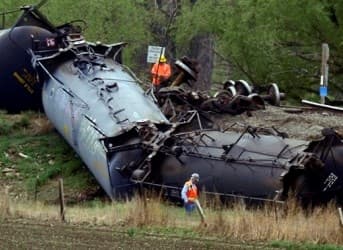Another oil train has derailed, this time near Denver, Colorado. A 100-car Union Pacific train carrying crude oil from the Niobrara shale was involved in the May 9 accident, in which six cars derailed and some 6,500 gallons of oil were spilled. Investigators are looking into the cause of the accident, which occurred 45 miles north of Denver.
The incident happened just two days after the U.S. government issued what was seen as a weak emergency order on rail safety. On May 7, the Department of Transportation announced an emergency order requiring railroad companies to inform state emergency management officials when they plan to move large volumes of crude oil through a state. That would apply to trains carrying more than 1 million gallons of crude oil – the equivalent of about 35 train cars.
The order also recommends the use of more crash-resistant railcars, but makes their use voluntary; it says the department is ‘strongly urging … [the use of] tank car designs with the highest level of integrity available.”
The move by the Transportation Department was in response to a fiery derailment and explosion of a train carry crude in downtown Lynchburg, VA on April 30, which spilled oil into the James River and caused the evacuation of hundreds of people.
The DOT-111 railcar design, which has been involved in several high-profile derailments and explosions, has been criticized for being too dangerous. But the flimsy, pill-shaped tankers are by far the preferred model used by the rail industry to transport crude. DOT-111s account for 80 percent of Canada’s oil-by-rail fleet, and 69 percent of America’s. In fact, of the 335,000 cars in the active fleet, 228,000 of them are the DOT-111s. Safer, reinforced rail car designs exist, but it will take time to replace the tens of thousands of “bomb trains” currently in operation.
U.S. Transportation Secretary Anthony Foxx told a Senate panel on May 7 that his agency had sent a draft proposal to the White House for rail-car standards and speed limit regulations, and is hopeful that a finalized slate of regulations can be issued before the end of 2014.
Senate Democrats were unimpressed by the department’s actions, even before the latest incident in Colorado. “If we know that we want to get rid of these [cars] that we don’t think are a safe transport vehicle, we should come up with a date certain,” Senator Maria Cantwell (D-WA) said during the hearing. “Making it voluntary isn’t enough.”
The Transportation Department has been criticized for moving too slow, even by oil industry proponents. The agency’s cautious pace is in stark contrast to the swift action taken by Canada last month; the country’s transport minister decided in April to completely phase out the DOT-111 tank cars over the next few years, and ordered the industry to remove 5,000 of the most dangerous oil tankers from the railways within 30 days.
Last week’s derailment in Colorado, coming before the ink was barely dry on the government’s voluntary guidelines, will put more pressure on U.S. officials to take stronger action.
Many observers expect to see an order yet this year for the mandatory phase out of the DOT-111 design in favor of reinforced train cars better equipped to move hazardous material like Bakken crude.
Speaking at last week’s Senate hearing, Sen. Chuck Schumer (D-NY) said, “The fact that the DOT issued this emergency order today so quickly after our push shows that Secretary Foxx gets it, and I sincerely hope they follow it up with a federal rule that requires the phase-out or retrofitting of outdated DOT-111 tank cars.”
By Nick Cunningham of Oilprice.com


















